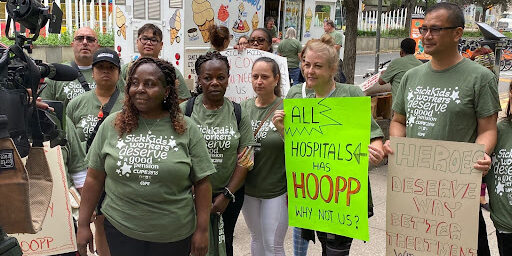Healthcare workers at SickKids hospital say they have to “work themselves to death” because their current pension plan would have them retire into poverty.
On Tuesday, June 25, more than 300 people rallied outside SickKids Hospital in Toronto to call on the employer to end their decades-long pension holiday. The Canadian Union of Public Employees (CUPE), one of the unions representing SickKids workers, said the hospital has not contributed to pensions since 1997 except for a two-year period between March 2020 until December 2022.
As a result, the payout offered under the SickKids plan is “far inferior” to the Healthcare of Ontario Pension Plan (HOOPP), which is offered to almost all other hospital workers in Ontario. All hospitals in Ontario are part of HOOPP except for SickKids and St. Mary’s general hospital.
Leonora Foster, president of the CUPE local at the hospital, has been working at SickKids for 36 years. If she retires next year, her current pension plan would provide a monthly payment of $1,930. She has joined the call for SickKids to switch the HOOPP, where her monthly payments would be $3,000 next year.
The most recent Canadian Income Survey placed Canada’s median annual income at $68,400 in 2021. According to Statistics Canada, low-income is measured as 50 per cent of the median income in the country. Anyone making less than $2,800 per month is low-income.
“If I decide to go next year, I will have to look at part-time jobs because I have a mortgage. I will not be able to make ends meet,” Foster said.
Danielle Orr, Senior Communications Advisor at SickKids, said their pension plan was established before HOOPP and has evolved over time to ensure our ability to deliver on our pension commitment to members. She said the plan has a long-term approach and good value.
“Joining HOOPP is an ongoing and long-term financial commitment that needs to be carefully evaluated for financial sustainability,” Orr said.
Tina Henderson, president of the Ontario Public Service Employees Union local at SickKids, said she believes the main motivation to not join HOOPP is the budget. The pension payments under the SickKids plan is low, meaning the plan is well funded as workers continue to pay into the plan. Henderson said this allows the hospital to take pension holidays and justify it because the pension plan is “doing well” on paper.
“They are not approaching it from a human perspective,” Henderson said.
The situation at SickKids is a severe example of an ongoing issue in Canada. According to a survey by HOOPP and Abacus data, more than half of Canadians feel financially unprepared for retirement.
Just over one-in-ten unretired Canadians do not expect to ever retire and one in four plan to continue working part-time after retirement.
Leonora Foster said this statistic is “heart-breaking.” She asks Canadians to remember, though, that while it is one in four people who will have to work after retirement in the rest of Canada, four out of four people at SickKids will face that same situation.
Tina Henderson highlighted that the reason many Canadians are in the situation is because wages have not matched pace with inflation. People no longer make enough to meet their basic needs and accumulate savings.
“They have no choice. It’s either find a part time job or make a decision about whether or not you’re going to use a food bank,” Henderson said.



